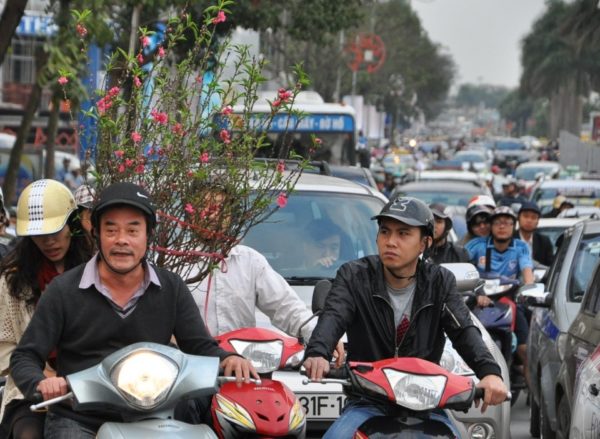
Mr. Ngo Van Nam, Head of Department building lifestyle and family culture (Ha Noi Department of Culture and Sports)
Among those above issues, HNMO reporter conducted a small interview with Mr. Ngo Van Nam, Head of Department building lifestyle and family culture (Ha Noi Department of Culture and Sports) in terms of giving the perspectives relating to the behavioral culture of each person during the Tet holiday. Cultured people are those who know how to give and take and admit with shame as well.
– With those days that Tet holiday is just around the corner, streets in Ha Noi and other metropolitans are packed like sardines, everyone tries their best to complete and to attain their personal stuff, even to the extent of violation of the road traffic law. As a role of cultural officer, what is your opinion about this phenomenon?
– This is actually a problem worth taking into consideration. Tet is the big holiday for all families, all individuals, reunion day, gathering together yet at the same time, this is also deemed as a bad news as traffic accidents occur regularly during these day-offs. There are people who are in such an urgent situation that they might pay little interest in the current traffic and drive carelessly and irresponsibly, or those who drink too much and hardly stay sober when participating in traffic. A significant number of tragic and unfortunate traffic accidents happened only as a result of a several careless seconds, lacking of caution caused by the motorist himself. The thing I would like to bring out to discuss here is not only the matter of the behavioral culture in public places and a law-abiding manner but also the responsibility of every single person when it comes to his/her own life, relatives and traffic participants as a whole.
– Despite being propagated and warned off regularly from time to time, the problems concerning code of conducts of each person in public places, on streets were and still are such long stories to tell. People still break the rule by dashing across the pavement without taking notice of the prohibition signs, or deliberately interrupting, crossing the red light when there is no sign allowing the motorist to pass. A penny for your thought about these violations, where do you think they come from?

Tet holiday’s traffic is always jam packed, walkers should pay respect to the road traffic law and come up with the more civilized manners
– From the viewpoint of behavioral culture, please tell me, how can you do to limit the traffic status perpetually happening in disorder way at the end of the year in these days and age?The widely accepted idea among most Vietnamese is “let bygones be bygones”, “stop fulfilling the old stuff”, as a consequence, everybody tries their best to finish their remaining personal jobs before the Tet is coming. And that may be the reason why people tend to live more hastily and urgently during Tet holiday. Taking the traffic in Ha Noi as an exemplary example these days, we will recognize fully the rush of the contemporary life these days and age. Personally speaking, I assume that the major reason of these infringements resulting from the fact that the consciousness of traffic participation, following the letter of the law and respecting people who walk on the road of most citizens is relatively poor. Secondly, the strict introduction of the disciplines applied to handle the violations seems quite loose. If the offenders still ask for mercifulness and forgiveness whenever they break the rule whether by accident or deliberately, the application of the strictly abiding law will be hardly possible and it will not work as a deterrent to others. With the same above people, when they go abroad, they suddenly become those who are law-abiding citizens, following the law closely, behaving very civilized, but when in Vietnam, they are ready to violate without any shame. The “little care” for law is still happening and the situation of everyone who only minds their own business when participating in traffic therefore continues recklessly.
– From the perspective of behavioral culture, I concur with the idea that the the most important thing is the awareness of each person. I completely support the tough acts of the law in respect of traffic cases of infringements, for instance, staff, civil servants who commit violations can be given the warning paper to the agency or unit that those are working for. This action is intended to provoke shame in every human being. If you are ashamed, you will want to change your behavior.
– As for the citizens, when behaving in public places, each person should have the concession and sympathy. In a public place, on the street, if everyone wants to interrupt or pass over, it will only make traffic more chaotic and troublesome. Sometimes, the impulse can cause very serious consequences. It costs an arm and a leg and sometimes a whole life only because someone wants to be fast in a couple of seconds. I hope, in these busy, hectic days, every person on the road will slow down, calm down and respect others.
Tet holiday, stop at the right time
– Vietnamese New Year shopping culture is different now but it seems that many people still have not escaped away from the psychology of “better redundant than missing”, before Tet holiday, they buy a lot, then it becomes too much and must be discarded, and causing waste appears as an inevitable consequence. From the perspective of family culture, according to you, is the food storage for Tet still suitable for today’s society?
– The habit of hoarding food for 3 days of Tet is still happening popularly in many families. Previously, based on the excuse that the condition of goods was scarce, thus people often stored a lot of food. However, the hoarding of many foods brings bad consequences, such as the products quickly become sour or rotten, must be discarded, causing waste, let alone the long-term food storage does not guarantee food hygiene and safety.
With today’s life, I think that families should take into consideration with their shopping problems, sufficient enough without too much unnecessary stuff. During years on end, the supermarket system, residential markets usually open very soon (on the second day of Lunar New Year), even in some particular places, the opening of the new year is also pushed to the very first day of Tet holiday in order to meet the increasing demands of customers. The reasonable purchasing will definitely help avoid the waste in New Year days.
– New Year wishes culture according to Vietnamese tradition has many conflicts. On the one hand, many people still perpetuate with their opinion that a solemn feast plays an important part in a warming welcome when the guests pay a visit to the host’s house, along with a few cup of wine to bring out the happiness all year round. On the other hand, the others suppose that the solemnity makes them feel tired, troublesome, even comes along with the fear of being forced to drink or eat against their will. How is your view on this issue?
– New Year wishes, the cultural beauty of Vietnamese people, need to be maintained and preserved. How to wish a happy New Year so that both homeowners and goers all feel happy and comfortable needs the straightforwardness from both sides. I think that, with a modern and open mindset like today, the hosts and their visitors should frankly express their wills when they meet each other.
For example, visitors are able to speak directly to homeowners about what they don’t want or they can’t drink alcohol. Besides, the host should also frankly ask for the guests’ wishes. When it comes to a group of guests about 20 people come to wish a happy new year, the owner could ask the members in the group about their desire to eat and drink in order to prepare sufficiently and efficiently instead of struggling to find enough 20 bowls, and to make sure they are treated equally with enough number of bowls served so that the guests do not have to go home empty handed. I think that the important thing among all about welcoming between the owner and the guest is the sincerity, openness, frankness so that both of them feel comfortable and happy. – The concept of the gathering in Vietnamese Tet is now different. Before, the elderly expect family reunion, while young people jump on the bandwagon of Tet which is traveling. According to you, do these needs fade the value of traditional Tet?

New year wishes culture needs the openness, sincerity from both homeowners and goers. (Photo: First prize in the photo competition of Ha Noi People in elegant and civilized behavior in 2018)
– Each age group will have a specific need and these are legitimate ones. The problem here is that generations need to find a common voice to meet each other’s needs. In recent years, traditional Tet holidays usually last from 7-9 days, which is a favorable condition for families to arrange a restful and reunion family schedule.
Youngsters should spend a couple of days to fulfill their duties, such as visiting their parents and relatives first. Older people should also be open-minded, so that children have their own time. Tet is a time to rest and have fun, so I think that every family member needs to have understanding and at the same time, sharing with each other in order to have a meaningful holiday.
– Thank you for your sharings!
Hoang Lan

